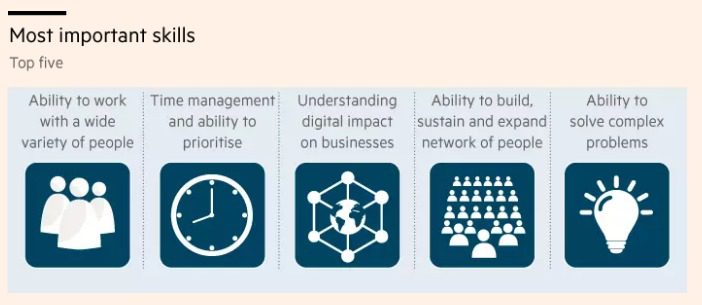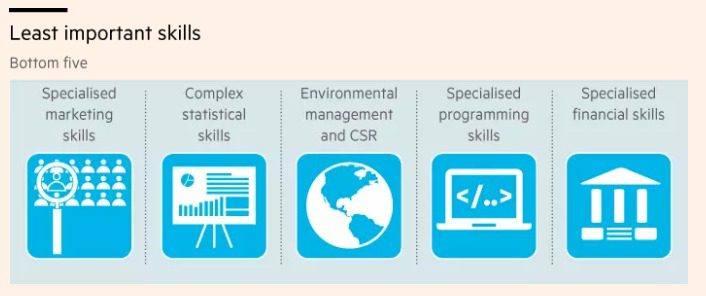What Are The Differences Between The World’s Best Online MBA Programs?

Every year, the online MBA becomes an increasingly more attractive option for business school students. With the flexibility to pursue your degree at your own pace and the chance to choose the best MBA program for you without considering location, prospective MBAs can truly make the most of their degree. And though some may be worried about missing out on a traditional classroom experience and the community that comes with it, changing educational technology has made it easier than ever for students to play an important part in their school’s community—without getting out of your pajamas.
The new MetroMBA Online Metro has rounded up some of the best online MBA programs available to students. To help determine which program fits your needs, we take a look at what sets each program apart—and what might just make it the perfect MBA for you.
Fox School of Business — Temple University
The Online MBA Program at Temple University’s Fox School of Business has the distinction of being ranked as the best online MBA in the country, and the best online MBA for veterans, according to U.S. News & World Report. The Online MBA at Fox offers total flexibility for students, with the opportunity to complete the degree within anywhere from 20 months to six years. To help students feel connected with the Fox community, the program offers weekly live web conferencing sessions allowing students to stay connected to faculty and classmates, as well as providing one-and-one career coaching.
The Online MBA at Fox is structured around three required courses that help prepare students for the program, 36 credits that can be completed at the student’s own pace, and a final consulting capstone course that offers total business immersion. The Fox MBA has also been recognized for its benefits for frequent travelers or military members. About 17 percent of students in the most recent class had some form of military experience.
The Fox Online MBA offers a number of areas of study, ranging from HR Management, International Business, Real Estate, Statistical Science, and much more. After completing the program, students on average saw a $30,000-plus salary increase and a median salary of $105,000 three years after graduation.
Hough Graduate School of Business — University of Florida
Although online MBAs tend to be on the rise in recent years, the Hough Graduate School of Business was one of the first business schools to offer a fully accredited online degree—almost twenty years ago. Today, the Financial Times and U.S. News & World Report consistently rank the Hough Online MBA among the top programs in the country.
The Hough Online MBA is the perfect opportunity for students that travel extensively, may move while pursuing their degree, or have a number of weekend commitments. To ensure that students still get face-to-face time with the school’s faculty and classmates, students return to campus once every four months for periodic residencies, allowing them to stay in touch with the community.
The online degree at Hough can be completed in either a two-year or one-year format. Both degrees give students the chance to choose among four areas of focus for their degree: entrepreneurship, finance, marketing, and international. The Hough Online MBA may also be perfect for students looking to immerse themselves in a global business education, as it offers students the chance at a Global Immersion Experience. Students have recently traveled to areas such as Argentina, United Arab Emirates, China, and Ireland.
Kelley School of Business — Indiana University
The Online MBA at the Indiana University Kelley School of Business is made up of 51 credit hours, 39 of which are required courses. The remaining credits can be used towards electives that will help students narrow the focus of their degree in an area such as Business law and ethics, economics, marketing, project management, operations, and more.
Each quarter, Kelley also offers an AGILE course—Accelerating Global Immersion Leadership Education—which frequently partner with top business schools around the globe. Students have recently traveled to such areas as India, Myanmar, South Africa, Botswana and Brazil.
The Kelley Online MBA also stands out because it offers students the chance to earn a dual degree online, pairing their MBA with an online MS in Business Analytics, Global Supply Chain Management, Marketing, Strategic Management, or Entrepreneurship & Innovation.
CHECK THIS OUT: No GMAT, No Problem
Kenan-Flagler Business School — University of North Carolina
The Online MBA at the UNC Kenan-Flagler Business School, better known as the MBA@UNC, may take students anywhere from 18 to 36 months to complete and include nine core courses in foundational business fields, such as economics, introductory finance, business strategy, operations management, and more. Students may also choose from over 30 electives to focus their degree in a particular concentration such as entrepreneurship or management consulting.
The MBA@UNC also requires students to complete two in-person immersions, which may be completed domestically or—for students interested in global business—internationally. Through the Student Teams Achieving Results (STAR) and Doing Business In (DBI) program, students also have the chance to study abroad at an MBA exchange partner school.
The MBA@UNC stands out thanks to its many post-graduate resources thanks to the Career & Leadership team. Replacing traditional on-campus recruiting, a Virtual Company Information Sessions allow executives from a variety of industries throughout the country to communicate with students about the hiring needs of their companies. Alumni can access these resources at any point after their graduation and can also take additional MBA courses as needed for their career development.
Tepper School of Business — Carnegie Mellon University
Carnegie Mellon’s Tepper School of Business offers students a flexible online degree that is completed through a combination of online and on-site experiences throughout a 32 month period. Each week, students will have access to a 70-minute online course that allows them to virtually interact in real time. Throughout the year, they will also be required to attend six “Access Weekends,” held at the university’s various locations throughout the country. The Tepper Online MBA may be the program that provides the most opportunities for in-person contact with classmates and faculty, so students that are interested in more face time as part of their online program may be particularly interested in this degree.
Tepper students are provided with in-depth career coaching and recruitment opportunities. Students will also visit a number of major companies in the country, such as Google, Amazon, JP Morgan, and Microsoft. Within just three months of graduation, roughly 91 percent of students in the Tepper Online MBA program were offered a full-time role.
W.P. Carey School of Business — Arizona State University
The Arizona State University’s Carey School of Business online MBA degree is structured around just one course at a time, each five weeks long. Students are immersed in an inclusive online environment that allows them to interact with classmates through case-based projects.
Carey, in comparison to several other schools noted on this list, is also unique in its option of pursuing a concurrent online degree, such as a Master of Legal Studies, MSE in Electrical Engineering, or MS in Industrial Engineering.
What Makes an EMBA Worth It? Students, Alumni Share Their Thoughts

In an interview with the Financial Times, five EMBA students and alumni spoke about the most important lessons they learned during their time in school. They covered a variety of topics including how the alumni network has helped them, the advice they would give to a new EMBA student, and what they learned from their classmates. In this article, we’ll provide a brief overview of a few of the most valuable tips.
Cultivate Your Global Network
For Idara Umoh Nickelson, an ’17 EMBA graduate at Northwestern’s Kellogg School of Management, the main opportunity she seized was to cultivate the global network that she was exposed to. This network, which spanned five campuses and four countries (United States, Canada, Germany, and Hong Kong), provided her with a range of valuable advice including “don’t feel guilty about the time you will spend on yourself.” This advice helped her learn to take advantage of every opportunity during her schooling, which helped her land a job in healthcare—her passion.
Use Your EMBA to Your Advantage
Casey Worthington, an ’19 EMBA student at Cornell Johnson, had a busy role in IT as a consulting-based project and program manager. It was a challenging position, but he wanted more; in particular, he wanted to move into a business leadership role. The EMBA allowed him to head in that direction while still balancing his family life and work. Post-enrollment, he accepted a dream job, and to Worthington, it was the EMBA that gave him the advantage.
Tailor Your Journey
There’s a lot of different advice that Blair Wood, an ’18 EMBA student at the London Business School, would give to aspiring students, but his main advice is to tailor your EMBA to your journey. “Be guided but not overly influenced by others . . . there is a relatively narrow window to maximize a valuable and rare chance for personal growth,” he told the Financial Times. “You need to explore the vast array of opportunities, find the blend that suits you and do things at your pace.”
Learn About Other Perspectives
For Krystal Bojan, an ’18 EMBA student at Columbia Business School, London Business School, and the University of Hong Kong, her experience has been about learning from a variety of different cultures and nationalities. Having an immersive educational experience around the world, Bojan has had to learn how different locations have different styles of communicating, problem-solving, and influencing. For example, she told the Financial Times: “Working for western multinationals where the culture was non-hierarchical, I was accustomed to approaching people directly to get things done. In Asia, it is strongly driven by carefully cultivated relationships and networks of influence, or ‘guanxi’.”
To read additional advice from each EMBA student or alumni and to see what an EMBA alumni from Melbourne Business School had to say, read the full article in the Financial Times.
Getting To Know The Denver Metro

Resting beside the scoping silhouette of the Rocky Mountains lies Denver, the 19th most populous metro area in the United States, and arguably its most serene, uniquely blending urbanization and naturalism.
As the Denver metro continues to expand and its economy continues to swell, we at MetroMBA are expanding as well. As we continue our coverage of the best MBA offerings in North America and the UK, we welcome our readers to take a look at the best business schools Denver has to offer.
Getting To Know The Denver Metro
If you haven’t heard already, Denver—The Mile High City—rests one mile [5,280 feet (1,609 meters)] above sea level. For those already familiar with the joyous overture of altitude sickness (bring a water bottle—everywhere), this not-so-fun-fact is only a small part of Denver’s academic environment. Located only several minutes south of center city Denver is the Daniels College of Business at the University of Denver. Founded in 1908, Daniels is among the eight oldest business schools in the United States, and features over 2,200 combined graduate and undergraduate students. Named after Bill Daniels, who donated an immense grant to the institution, the school officially changed its name from the College of Business Administration to the Daniels College of Business in 1994.
The school is routinely lauded by the likes of U.S. News, Forbes, and the Financial Times for its highly-recommended entrepreneurial and Executive MBA programs, as well as the MBA@Denver Online MBA. For the 2017-18 academic year, the Daniels full-time MBA (known as the Denver MBA), will cost students $69,391. This is just shy of the average Daniels MBA graduate average starting salary of $69,842. About 68 percent of Daniels’ graduates earn a full-time job just three months after graduation.
Located right in the middle of center city Denver is the Colorado University Denver Business School, which features five different MBA program offerings, including: a full-time Professional MBA; an 11-month accelerated MBA; the CU Denver Business School Executive MBA; the Health Administration MBA; and the highly-ranked Executive MBA Program in Health Administration, which is regarded by U.S. News as one of the 25 best “graduate programs in health services administration.” The UC Denver Business School, which was originally part of CU Boulder, has a second location 20 miles south of its center city location at the Liniger Building, formally part of CU South Denver.
Its original home, the University of Colorado Boulder, houses the most highly-regarded business institution in the state: the Leeds School of Business. Ranked among the best business schools in the country by both U.S. News and Forbes, Leeds is located less than 30 miles northwest of center city Denver. It offers both an exceptional full-time and Evening MBA, enrolling around 300 total students in both programs.
The accredited business school is, in fact, two years older than the aforementioned Daniels College of Business, making it the oldest business school in the state. Leeds holds a staggering 97 percent graduation rate for MBA students, who earn an average of $80,123 upon receiving full-time employment. MBA students that graduate from Leeds have been recently employed by notable companies like Deloitte, McKinsey & Co., Microsoft, Oracle, and more.

The Leeds School of Business at CU Boulder
Travel about an hour north of Denver and you’ll find the Colorado State University College of Business, located in Fort Collins. The CSU College of Business, located on the north end of the CSU campus, hosts a myriad of well-rounded MBA programs, including the universally well-regarded Online MBA—ranked among the 20 best in the world by the Financial Times. The MBA program is also one of the most affordable in the state, with current full-time tuition coming at a total cost of $40,368, and $40,897 for part-time students.

Colorado State University
The Denver Metro Business Community
After the federal and state government, both the first and second largest employers in the state, Denver is home to several of the country’s largest healthcare institutions, including American Medical Response and DaVita, as well as large employment branches for companies like Kaiser Permanente. The metro area is also home to the famous Coors Brewing Company, as well as more than 160 other brewing companies, which helped the city earn the nickname “The Napa Valley of Beer.” In addition, Denver is the original home of Western Union, Frontier Airlines, and multiple fast food chains, including Chipotle, QDoba Mexican Grill, and Quizno’s. According to the U.S. Bureau of Labor Statistics, the city has also seen employment figure increases in almost all industries.
Explore MBA programs in the Denver metro, subscribe to our informative weekly newsletter, and follow us on Facebook.
Georgia Tech Scheller EMBA Ranked Among Best in the Country

The most recent rankings from the Financial Times places Georgia Institute of Technology Scheller College of Business‘ Executive MBA program among the best in the U.S.
Each year, The Financial Times compiles a list of the top 100 Executive MBA programs throughout the country, evaluating each program on a number of important features. Among the top business news organizations in the world, Financial Times determined their ranking through alumni surveys that looked at factors such as career progression, international reach, salary growth, and faculty credentials.
“I am pleased that the Financial Times has recognized Scheller College EMBA program’s commitment to our students and their achievements,” Scheller Dean Maryam Alavi said of the ranking. “The EMBA program excels in developing business leaders who are innovative, entrepreneurially minded, analytically skilled and who succeed at the intersection of business and technology.”
In the 2017 ranking, the Scheller EMBA was recognized as the top Executive MBA program in Georgia and the 15th best program in the United States. For facilitating career progress, the program was named second best in the U.S. and seventh best throughout the world.
The EMBA program at Scheller is nationally recognized for its career development program, which offers 1:1 coaching and advising, as well as providing many opportunities for executive networking and development workshops. The program, which takes 17-months to complete, offers specializations in the fields of Global Business and Management Technology. The program is offered exclusively on weekends, allowing up-and-coming professionals to continue their careers while earning their degree.
Highest Paid Starting Salaries for Toronto MBA Grads

Earning an MBA in Toronto can be a practical decision for a myriad of reasons. Forbes named Canada the best country for business in the G20, with Toronto as its formal financial and business capital. It stands to reason Toronto may be one of the strongest areas for business not just in North American, but around the world as well. Its advantageous position close to the U.S. border makes the city a hotbed of international commerce, and as the fourth largest city on the continent, Toronto provides a wealth of opportunities for motivated professionals.
As though these reasons weren’t incentive enough to pursue higher education in Toronto, the city has the second highest quality of life in North America, according to the Mercer Quality of Living Survey. The city’s vital university system is full of talented and aspiring industry leaders ready to launch their own careers, readily taking advantage of everything the city has to offer.
For those of you planning to pursue your MBA in this cultural and fiscal epicenter, we’ve laid out which school grads have the highest starting salaries in the city.
The Highest Paid Toronto MBA Salaries
Ivey Business School—Western Canada University
Graduates from Ivey Business School will not be disappointed with the opportunities made possible by their degree. In 2016, 90 percent of graduating MBA students looking for jobs had received an offer by September and, by December, an impressive 96 percent of students were fielding offers. The average starting salary for grads in 2016 was $104,007 ($84,098 USD). The base salaries ranged from $40,000 to $192,000 ($32,344 to $155,255 USD), with the higher end of this range going to students who pursued consulting jobs. Since this program is just one year long, the high average starting salaries for students indicate a considerable return on investment, in terms of both money and time. Bloomberg BusinessWeek also ranked Ivey’s MBA as the best MBA program in Canada for the past three years.
YOU MIGHT ALSO LIKE: Toronto’s Best Nonprofit MBA Options
Rotman School of Management—University of Toronto
Those looking for an MBA education that will provide ample chance to earn a generous starting salary may be impressed with the possibilities open to Rotman School of Management grads. The average base salary for graduates in 2016 was $92,524 ($74,819 USD). The 2016 class had an employment rate of 80 percent within three months of graduation and an 85 percent employment rate after six months. The range of starting salaries for the class of 2016 went as high as $214,737 ($173,486 USD) in the legal services industry. Moreover, the Financial Times has named Rotman the best business school in Canada every year for over a decade.
Schulich School of Business—York University
An average starting salary of $91,860 ($74,282 USD) for the class of 2016 makes a Schulich School of Business an ideal place for motivated students to jump-start their careers. With 89 percent of MBAs from the class of 2016 hired within three months of graduation, Schulich grads clearly have a competitive edge in the business community. Schulich’s program is also renowned for its flexibility. Students can switch seamlessly between part-time and full-time enrollment, and can choose to accelerate their program for the opportunity to earn their degree in just eight months.
What Employers Do and Don’t Look for In An MBA Graduate

Earning an MBA can often be a huge boost for graduates entering the job market, from opportunities for upper-level management roles to increased salaries.
But securing that job post-graduation can still be an uphill climb. Even with an MBA, students often find themselves struggling to understand how they fit within a changing job market. As the market continues to shift, understanding exactly what employers are looking for in their MBA applicants—and what they aren’t looking for—can be crucial for graduates as they search for and apply for their perfect job.
Thankfully, a recent survey from the Financial Times looked at the job market from the perspective of employers: what they are in need of in terms of MBA job seekers, and how MBA applicants can be more realistic regarding for the roles for which their new degree will qualify them. Unfortunately for many MBAs, the survey results may come as a surprise when they reflect on what skills they hoped their degree would offer in the first place. Yet, a critical understanding of what employers are and aren’t looking for can help job seekers re-frame the way they understand themselves and their prospective careers.
What Employers Want
The survey looked into the most important skills that employers look for in new MBA talent. Perhaps surprisingly, the five most important skills determined by the survey were actually not core MBA subjects. “Soft skills,” such as the ability to prioritize (desired by 72 percent of employers), the ability to work with a variety of people (76 percent of employers), and the ability for employees to effectively manage their time were the most desired and difficult to find, according to the survey.
The most difficult skills to recruit—the skills companies are sorely in need of—were most commonly named as the ability to use social media for the business’ needs, financial forecasting, big data analysis, brand storytelling skills, and the ability to train others.

The five most important skills, according to the Financial Times survey.
What Employers Don’t Want
The least important skills for an MBA, according to the survey, were those most often thought of as “hard skills,” such as specialized skills in marketing, finance, programming, or complex statistical skills. Similar skills were mentioned as the least difficult skills to recruit—the ability to solve complex problems and specialized marketing skills are often seen as common fare among MBA graduates and therefore a candidate with such skills won’t necessarily stick out.
Many surveyed employers said that past experience with MBA-holding employees had left them disappointed, with the degree-holder having difficulty turning concepts into practice. Many employers said that, while an MBA degree may be a nice bonus for a job candidate, the overall hiring decision is more based on the individual’s industry qualifications, rather than their degree.

These skills may be less necessary than MBA grads anticipate.
What Do You Need To Do?
So far, the results of the Financial Times survey may be disappointing for MBAs who have worked hard for their business education. No need to get concerned just yet, however. The employer response may have less to do with the idea that the skills of an MBA grad aren’t necessary in a company and more to do with a perception gap; the belief that business schools will not teach students the skills they need, and therefore that they do not need MBAs at their company.
Most of the work in convincing a skeptical employer your degree is worthwhile is simply convincing them that the skills learned as part of your degree are the same ones they desire. Many business schools are attempting to change the way MBAs are perceived and the type of skills that are associated with graduates. Julie Morton, Associate Dean of Careers Services and Corporate Relations at Chicago’s Booth School of Business, has already set half of her team to the work of promoting the value of MBA-holders in the workforce. Overall, much of the work will fall on business schools to market their graduates as holding the skills most desired by recruiters.
On a more individual level, however, the survey results also indicate that MBA grads can be more judicious in the roles that they apply to and the way they market themselves to potential employers. By focusing on the skills desired most—and the hardest to recruit—and ensuring that employers know these are the exact skills an MBA education offers, both employer and employee can benefit.
